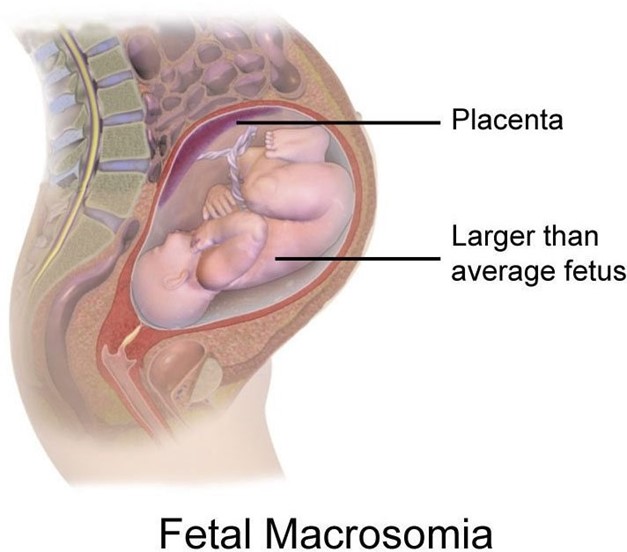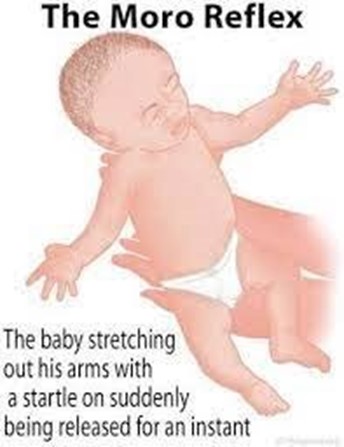Parents have been told their child has fetal alcohol syndrome (FAS). Which statement by a parent indicates that additional teaching is required?
Select one:
"Our baby's newborn rash is from this syndrome."
"His face looks like it does due to this problem."
"He can show signs of withdrawal from alcohol exposure like jiteriness, sweating, hyper reflexes, poor feeding and not sleeping well."
"He is at risk of having intellectual disabilities, so we will need to get extra services to support him."
The Correct Answer is A
Choice A Reason: "Our baby's newborn rash is from this syndrome." This is because this statement by a parent indicates that additional teaching is required, as it shows a misunderstanding or confusion about FAS and its manifestations. FAS is a condition that occurs when a woman consumes alcohol during pregnancy, which can affect the development and function of various organs and systems in the fetus and child. FAS can cause physical, behavioral, and cognitive problems such as facial abnormalities, growth retardation, learning difficulties, and atention deficits. FAS does not cause newborn rash, which is a common and benign condition that affects many newborns regardless of maternal alcohol intake. Newborn rash is also known as erythema toxicum neonatorum or baby acne, which is characterized by small red bumps or pustules on the face, chest, or back that usually disappear within a few weeks.
Choice B Reason: "His face looks like it does due to this problem." This is a correct answer that indicates adequate understanding of FAS and its features. Facial abnormalities are one of the characteristic signs of FAS, which include small eye openings, thin upper lip, flat nasal bridge, and smooth philtrum (the groove between the nose and upper lip).
Choice C Reason: "He can show signs of withdrawal from alcohol exposure like jiteriness, sweating, hyper reflexes, poor feeding and not sleeping well." This is a correct answer that indicates adequate understanding of FAS and its complications. Signs of withdrawal are possible effects of FAS, which occur when the fetus or newborn is exposed to alcohol in utero or through breast milk, which can cause neurotoxicity and dependency. Signs of withdrawal can include jiteriness, sweating, hyper reflexes, poor feeding, and not sleeping well, as well as irritability, seizures, or tremors.
Choice D Reason: "He is at risk of having intellectual disabilities, so we will need to get extra services to support him." This is a correct answer that indicates adequate understanding of FAS and its implications. Intellectual disabilities are potential outcomes of FAS, which affect the cognitive development and function of the child. Intellectual disabilities can cause problems with memory, Reasoning, language, and social skills. Extra services and support may be needed to help the child achieve their optimal potential and quality of life.
Nursing Test Bank
Naxlex Comprehensive Predictor Exams
Related Questions
Correct Answer is A
Explanation
Choice A Reason: Macrosomic fetus is a fetus that weighs more than 4000 grams or 8 pounds 13 ounces at birth. It is not a common complication of teenage pregnancy, but rather of maternal diabetes, obesity, or a history of large babies.
Choice B Reason: Preeclampsia is a condition characterized by high blood pressure and proteinuria in pregnancy. It can cause serious complications for both the mother and the baby, such as seizures, organ damage, growth restriction, and placental abruption. Teenage pregnancy is a risk factor for preeclampsia, especially if the mother is younger than 15 years old.
Choice C Reason: Inadequate nutritional status of mother is a condition where the mother does not consume enough calories, protein, vitamins, minerals, or fluids during pregnancy. It can affect the growth and development of the baby and increase the risk of low birth weight, preterm birth, and birth defects. Teenage pregnancy is a risk factor for inadequate nutritional status of mother, as teenagers may have poor dietary habits, eating disorders, or limited access to food.
Choice D Reason: Cephalopelvic disproportion is a condition where the size or shape of the baby's head or body is too large to fit through the mother's pelvis. It can prevent normal vaginal delivery and require cesarean section. Teenage pregnancy is a risk factor for cephalopelvic disproportion, as teenagers may have smaller or immature pelvises that are not fully developed.

Correct Answer is B
Explanation
Choice A Reason: The cheek of the newborn is touched, and the newborn turns toward the side that was touched. This is an incorrect answer that describes a different reflex called the rooting reflex. The rooting reflex is a feeding reflex that helps the newborn locate the nipple and initiate sucking. The rooting reflex is elicited by stroking the cheek or corner of the mouth of the newborn, which causes them to turn their head and open their mouth toward the stimulus.
Choice B Reason: The newborn is suddenly lowered or startled, and they extend their arms, legs and neck, then rapidly bring their arms together. This is because this response describes the Moro reflex, which is a primitive reflex that is present at birth and disappears by 3 to 6 months of age. The Moro reflex is elicited by simulating a falling sensation or a loud noise, which triggers a fear response in the newborn. The Moro reflex consists of four phases: extension, abduction, adduction, and crying.
Choice C Reason: The newborn is supine and their head is turned to one side, then the arm on that same side extends. This is an incorrect answer that refers to another reflex called the tonic neck reflex. The tonic neck reflex is a postural reflex that helps prepare the newborn for voluntary reaching. The tonic neck reflex is elicited by placing the newborn in a supine position and turning their head to one side, which causes them to assume a "fencing" posture with one arm extended and one arm flexed.
Choice D Reason: The lateral aspect of the sole of the newborn's foot is stroked, and the toes extend and fan outward. This is an incorrect answer that indicates a different reflex called the Babinski reflex. The Babinski reflex is a neurological reflex that tests for spinal cord integrity. The Babinski reflex is elicited by stroking the lateral aspect of the sole of the foot from heel to toe, which causes the big toe to dorsiflex and the other toes to fan out.

Whether you are a student looking to ace your exams or a practicing nurse seeking to enhance your expertise , our nursing education contents will empower you with the confidence and competence to make a difference in the lives of patients and become a respected leader in the healthcare field.
Visit Naxlex, invest in your future and unlock endless possibilities with our unparalleled nursing education contents today
Report Wrong Answer on the Current Question
Do you disagree with the answer? If yes, what is your expected answer? Explain.
Kindly be descriptive with the issue you are facing.
